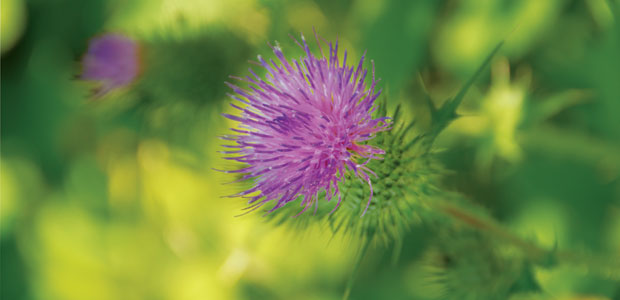Advertisement
Milk Thistle
Milk thistle (Silybum marianum) is a member of the aster family with a long history of medicinal use. Today the plant is recognized by herbalists for its healing effects on one of the most important organs in the body–the liver. Hundreds of scientific studies have confirmed that preparations made from the seeds of this prickly … Continued

Milk thistle (Silybum marianum) is a member of the aster family with a long history of medicinal use. Today the plant is recognized by herbalists for its healing effects on one of the most important organs in the body–the liver.
Hundreds of scientific studies have confirmed that preparations made from the seeds of this prickly plant can substantially protect the liver from damage and help convert foreign substances as well as chemical and environmental toxins into less harmful, water-soluble substances that can then be easily excreted from the body.
Numerous clinical trials firmly support milk thistle for the treatment of cirrhosis, acute and chronic hepatitis, liver or spleen inflammation, bile insufficiency, and elevated liver enzyme levels.
How It Works
The active constituents in milk thistle include betaine, essential fatty acids, trace minerals, and a group of flavonolignans collectively known as silymarin. These constituents work together to prevent liver damage and enhance detoxification through several key mechanisms.
Alcohol and toxic chemicals can deplete the system of glutathione, which is responsible for destroying harmful compounds and free radicals. Silymarin not only prevents the depletion of glutathione but has been shown to actually increase glutathione levels in individuals with normal liver function.
Milk thistle alters cell membranes so that only small amounts of toxins can penetrate liver cells and helps increase hepatocyte protein synthesis, a process whereby cells produce essential proteins needed for the regeneration and repair of liver cells. Milk thistle also acts as an anti-inflammatory for the liver and spleen, supports immune function, and is known for its potent antioxidant properties.
Where It Works
Recommended for chronic pancreatitis caused by alcohol abuse and to prevent the formation of gallstones, milk thistle improves digestion and stimulates the flow of bile through the liver and gallbladder. It also helps balance cholesterol levels and, when combined with burdock seed tincture, is useful for dry, itchy, scaly skin conditions such as psoriasis and dry eczema.
Milk thistle protects liver cells and reverses the effects of highly toxic alkaloids such as phalloidin in cases of Amanita phalloides mushroom poisoning. In addition, it stimulates milk flow in breast-feeding mothers and has a mild laxative effect.
Many chemotherapy drugs can cause harmful side effects, including liver damage. Preliminary findings of a randomized pilot study conducted by the National Cancer Institute in 2005 showed that there was no evidence of an adverse interaction between milk
thistle and chemotherapy drugs used to treat acute lymphoblastic leukemia, a common form of cancer in children. The study also demonstrated that in some cases milk thistle produced a noticeable improvement in lessening the effects of liver toxicity during chemotherapy treatment.
A recent laboratory trial published in the Journal of the National Cancer Institute concluded that milk thistle appeared to slow the progression of lung cancer in mice. After six months researchers found smaller lung tumours, fewer new blood vessels in the tumours, and lower levels of cancer-promoting chemicals in the silymarin test group.
How to Take It
Milk thistle is well tolerated and can be taken long-term with no known side effects or contraindications. Many herbalists believe that the standardized tincture is the most effective. A typical dose is 40 drops three times daily.
Silymarin is only soluble in alcohol, precluding its use as a tea. However, a tincture (an infusion of the plant in alcohol) may be added to hot water to create a tea drink; add 30 to 60 drops of the tincture to a cup of near-boiling water. The powdered seed is also available in capsule form; recommended dose is 200 to 400 mg taken in divided doses with meals.
While the seeds are best known for their therapeutic properties, all parts of the plant can be used. Once the leaves have been trimmed of their spines they make a flavourful addition to salads; the root of the plant can be roasted or boiled. The seeds can also be prepared by lightly toasting them in the oven or in a hot frying pan with tamari or soy and eaten as a snack throughout the day.
If your diet is high in processed foods or if you are regularly exposed to harmful chemicals; if you consistently use alcohol, recreational drugs, or prescription medications; or if you have a family history of liver disease, milk thistle offers a safe and reliable solution to help protect, regenerate, and optimize healthy liver function.




